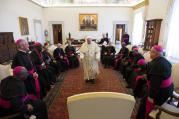Click here if you don’t see subscription options








Society Owes Them
In Adults Left Behind (10/11), William J. Byron, S.J., observes that adults now unable to read were perhaps failed by their schools when they were children, and points out that society owes them something now. Many of those who could not read in school then dropped out of school, went to the streets, drifted into drugs and crime and found themselves in prison. Some of them also had learning disabilities (like dyslexia) and had little support from dysfunctional families. It has been estimated that 40 percent of inmates in state prisons cannot read adequately, and an abnormal percentage of them have learning difficulties.
This is another case of finding the root cause of symptoms and trying to do something about it. Society owes these people a better effort to overcome their disabilities, educate them and enable them to survive productively in society.
Rudy Cypser


Work to Do
Ah, the pity of it. I refer to Jolted by Affluence, by Thomas G. Casey, S.J., (11/27). The Island of Saints and Scholars is only a single generation removed from penury, the emigrant ship and coercive priests and bishops, not to mention the Magdalene Laundries, the industrial schools and the reformatories, mostly staffed by religious. And what are the Irish doing with their newfound wealth and freedom? They are enjoying it. Is Mass attendance down? For sure! And why is that, you ask, and quick as a whippet you answer materialism.
Not so fast. For most of my own youth in Ireland, 1940 to 1965, Catholics were more driven than led, more threatened than instructed, and this by a clergy who were being rapidly overtaken in education and understanding by their flocks. Throw in the odd sexual abuse scandal and the pathetic attempts at cover-up, and you have a recipe for confusing the messenger with the message. Any hope at all, at all?
Well yes, there is; but it won’t come quickly and it won’t be dependent on Polish immigrants, however pious they be. First there is a terrible need for more good priests, and they don’t need to be Irish-born. Nigerians and Ghanaians will do just fine. A bit of a payback, you might say. Then, as the old bishops schooled in 19th-century clerical dominance die off, their replacements need to believe truly that they are the servants of the servants of God. Given a generation or so, there is a fair chance that the unchurched will be once again churched, but there will be no going back to the good old days of That’s what Father says; so it is. So enough of the weeping. There is work to do.
Sean O’Connor
